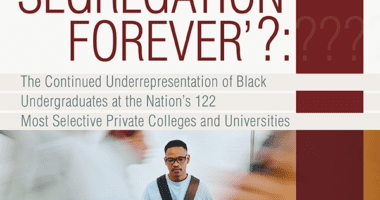How Education Can Better Serve the Modern-Day Student
For nearly six years, Reid Setzer has been at Young Invincibles, where he most recently served as director of public policy. Now, this one-time Jeopardy! runner-up is Ed Trust’s director of government affairs. Find out why education is his passion and how he’ll push for change on the Hill to better serve the next generation of students.
What made you want to work for Ed Trust?
While I was at Young Invincibles, I had the opportunity to work with a number of Ed Trust staffers over the years on various higher ed issues, and have been impressed by the quality of professionals here. I’ve always admired Ed Trust’s dedication to equity in higher education, and how they’re always looking to make an impact. The fact that Ed Trust is headed up by Secretary King is a draw, as is having my direct supervisor be Denise Forte, who I’m looking forward to learning from. I’m a lawyer by trade, so I appreciate those who can educate me on policy issues. And although Ed Trust has a national reach, they’re also in the states getting input at the state level. I find that having more contact with people outside of D.C. is important from a policy perspective. Also, it’s a nice change of pace to narrow my focus down to just education, which is my passion.
Why are you passionate about education?
I think when done fairly and correctly, education is the great equalizer. You can’t really do that if it’s not of equal access to folks, not of equal affordability, or equal quality. Looking at the challenges in my everyday life and greater society, I see education as a microcosm of larger structural inequities in American society. Starting to tackle them through an education lens isn’t going to be sufficient, but I do think it’s necessary to start there. In the short term, having a system that facilitates flourishing is both economic imperative but also a moral one. Higher ed, specifically. There’s a massive disconnect now than from previous generations.
Speaking of generations, based on your experience and what you’ve heard from students, what is it that Millennials and Generation Z want out of their education?
Well, there are systemic weaknesses that make the system non-responsive to who’s going to school now. 1 in 4 is a parent. 38% are over 25. We also know that anywhere between 60% and 70% of students are working. So you have a system that prizes full-time attendance, is trying to get students through school as fast as possible, but also isn’t supporting them financially. That can become an obstacle for many people. So you see people interning for free, working for money, going to school full-time. That’s just not sustainable. You can give things like free tuition, and Ed Trust recently wrote a nice report on states’ free college plans, but at the end of the day, we know that at the majority of two-year and four-year public universities the bulk is not the cost of tuition, but attendance: eating, living, transportation, books, childcare. So you have to look at it a holistic way. Otherwise, you’re only giving students essentially half a loaf. While it’s tremendously helpful to have free tuition, you have to have a broader focus than that. You have to acknowledge what it means to be a student. But basically, the college system was set up for middle-class White people in the 1950s. But now, you have the most diverse generation in history, but for the generation who follow them. And the system isn’t serving them as well as it could.
Can the system be restructured to serve the modern-day student?
Yes it can be. You talk about student parents, colleges could provide on-campus childcare. Wraparound services — people know about programs like CUNY ASAP that not only tackle tuition upfront, but offer counseling and Metrocards. Colleges can invest in these types of programs, and can expand them. Colleges could give students more financial aid so they don’t have to take on so much debt. On the federal level, they could increase the Pell Grant to approach anything similar to its purchasing power in the 1970s. We could reshape how all that works. Together, we can make things better.
What do you think Ed Trust can accomplish on the Hill?
I think the next 12 months pose a unique opportunity to create a more student-centric and racially equitable higher education system through HEA [Higher Education Act] reauthorization, and can create the foundation for even more transformative change in the future. Additionally, the appropriations process is always an opportunity to push for increased investment in resources for students.









